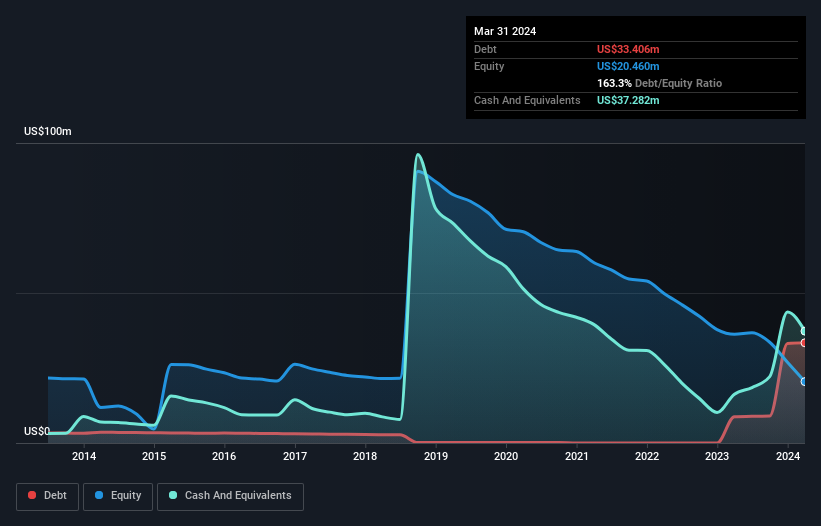- United States
- /
- Medical Equipment
- /
- NasdaqGS:APYX
Is Apyx Medical (NASDAQ:APYX) Using Debt In A Risky Way?

Legendary fund manager Li Lu (who Charlie Munger backed) once said, 'The biggest investment risk is not the volatility of prices, but whether you will suffer a permanent loss of capital.' So it seems the smart money knows that debt - which is usually involved in bankruptcies - is a very important factor, when you assess how risky a company is. As with many other companies Apyx Medical Corporation (NASDAQ:APYX) makes use of debt. But the more important question is: how much risk is that debt creating?
When Is Debt Dangerous?
Debt and other liabilities become risky for a business when it cannot easily fulfill those obligations, either with free cash flow or by raising capital at an attractive price. Ultimately, if the company can't fulfill its legal obligations to repay debt, shareholders could walk away with nothing. While that is not too common, we often do see indebted companies permanently diluting shareholders because lenders force them to raise capital at a distressed price. Having said that, the most common situation is where a company manages its debt reasonably well - and to its own advantage. When we examine debt levels, we first consider both cash and debt levels, together.
View our latest analysis for Apyx Medical
What Is Apyx Medical's Debt?
The image below, which you can click on for greater detail, shows that at March 2024 Apyx Medical had debt of US$33.4m, up from US$8.78m in one year. But it also has US$37.3m in cash to offset that, meaning it has US$3.88m net cash.

How Strong Is Apyx Medical's Balance Sheet?
Zooming in on the latest balance sheet data, we can see that Apyx Medical had liabilities of US$10.6m due within 12 months and liabilities of US$39.7m due beyond that. On the other hand, it had cash of US$37.3m and US$12.5m worth of receivables due within a year. So these liquid assets roughly match the total liabilities.
This state of affairs indicates that Apyx Medical's balance sheet looks quite solid, as its total liabilities are just about equal to its liquid assets. So it's very unlikely that the US$50.9m company is short on cash, but still worth keeping an eye on the balance sheet. While it does have liabilities worth noting, Apyx Medical also has more cash than debt, so we're pretty confident it can manage its debt safely. The balance sheet is clearly the area to focus on when you are analysing debt. But it is future earnings, more than anything, that will determine Apyx Medical's ability to maintain a healthy balance sheet going forward. So if you're focused on the future you can check out this free report showing analyst profit forecasts.
In the last year Apyx Medical wasn't profitable at an EBIT level, but managed to grow its revenue by 14%, to US$50m. We usually like to see faster growth from unprofitable companies, but each to their own.
So How Risky Is Apyx Medical?
By their very nature companies that are losing money are more risky than those with a long history of profitability. And in the last year Apyx Medical had an earnings before interest and tax (EBIT) loss, truth be told. Indeed, in that time it burnt through US$10m of cash and made a loss of US$23m. While this does make the company a bit risky, it's important to remember it has net cash of US$3.88m. That means it could keep spending at its current rate for more than two years. Overall, we'd say the stock is a bit risky, and we're usually very cautious until we see positive free cash flow. When analysing debt levels, the balance sheet is the obvious place to start. But ultimately, every company can contain risks that exist outside of the balance sheet. For instance, we've identified 3 warning signs for Apyx Medical that you should be aware of.
When all is said and done, sometimes its easier to focus on companies that don't even need debt. Readers can access a list of growth stocks with zero net debt 100% free, right now.
If you're looking to trade Apyx Medical, open an account with the lowest-cost platform trusted by professionals, Interactive Brokers.
With clients in over 200 countries and territories, and access to 160 markets, IBKR lets you trade stocks, options, futures, forex, bonds and funds from a single integrated account.
Enjoy no hidden fees, no account minimums, and FX conversion rates as low as 0.03%, far better than what most brokers offer.
Sponsored ContentNew: Manage All Your Stock Portfolios in One Place
We've created the ultimate portfolio companion for stock investors, and it's free.
• Connect an unlimited number of Portfolios and see your total in one currency
• Be alerted to new Warning Signs or Risks via email or mobile
• Track the Fair Value of your stocks
Have feedback on this article? Concerned about the content? Get in touch with us directly. Alternatively, email editorial-team (at) simplywallst.com.
This article by Simply Wall St is general in nature. We provide commentary based on historical data and analyst forecasts only using an unbiased methodology and our articles are not intended to be financial advice. It does not constitute a recommendation to buy or sell any stock, and does not take account of your objectives, or your financial situation. We aim to bring you long-term focused analysis driven by fundamental data. Note that our analysis may not factor in the latest price-sensitive company announcements or qualitative material. Simply Wall St has no position in any stocks mentioned.
Have feedback on this article? Concerned about the content? Get in touch with us directly. Alternatively, email editorial-team@simplywallst.com
About NasdaqGS:APYX
Apyx Medical
An energy technology company, designs, develops, manufactures, and sells electrosurgical equipment and medical devices in the United States and internationally.
Good value with adequate balance sheet.
Similar Companies
Market Insights
Community Narratives



